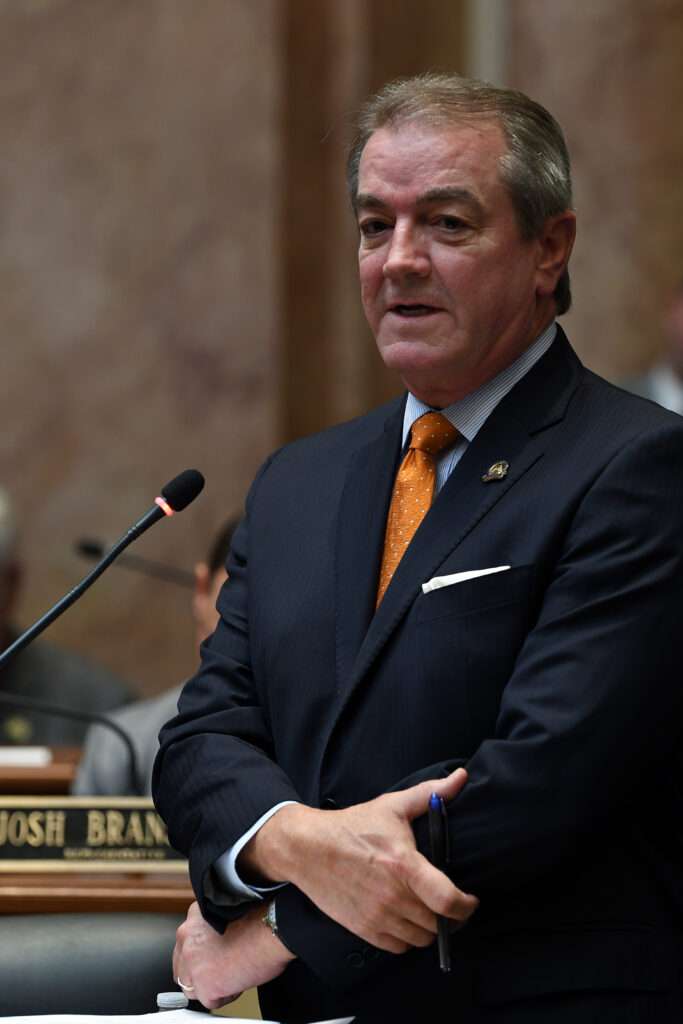Legislature votes to phase out tax on aging bourbon despite pleas from local officials

Last-minute changes to the bill were not available for the public to see until after committee vote
by Liam Niemeyer, Kentucky Lantern
FRANKFORT — A bill to give Kentucky’s bourbon industry a property tax break on barrels of aging whiskey — something distillers have been asking for and some local communities say will “devastate” their budgets — saw last-minute changes before passing the legislature on the last day of the session
House Bill 5, primarily sponsored by the chair of the House Appropriations and Revenue Committee Rep. Jason Petrie and House Speaker David Osborne, would slowly lift the bourbon barrel tax starting in 2026, increasing the tax cut by a few percent each year and accelerating the tax cuts over time.
There were 11.4 million bourbon barrels in the state as of 2021, and the bourbon industry paid just shy of $40 million in local and state taxes on those barrels in 2022. The breakdown of tax revenue that year in counties where distilleries were located had local schools receiving about $26 million of that, with local and state governments receiving the rest. One of the revisions addressed reimbursing local school districts, fire departments and emergency services for funding they would lose under the tax break.
HB 5 divided both party caucuses throughout its movement. Lawmakers representing communities that are home to distilleries and benefit from the property tax in particular opposed the legislation.
The Senate approved the revised HB 5 by a vote of 25-12 with 11 Republican senators joining one Democrat in opposition. The House concurred with the changes to HB 5 made in the Senate committee substitute by a 60-39 vote with more than 20 Republicans voting against it.
A spokesperson for Gov. Andy Beshear’s office did not respond to a request for comment on whether he would sign or veto the legislation.
The bill was changed through a bill substitute in a special-called Senate Appropriations and Revenue Committee meeting just nine hours before midnight, the deadline for legislation to pass. The copy of the substitute wasn’t available online for the public or reporters to review while it was being debated on and voted on in the committee until after the committee had advanced the bill and adjourned.
Bardstown Mayor J. Richard Heaton, one of a trio of local leaders who spoke against the bill in the special committee meeting, said the city will be paying off debt from updates to his city’s water infrastructure to accommodate distilleries for a long time.
“People in our three counties have been asking us what is the goal of this legislative body? Is it to truly make the bourbon industry a tax-exempt industry in the state of Kentucky?” Heaton said.
Chair of the Senate Appropriations and Revenue Committee Sen. Chris McDaniel, R-Ryland Heights, voted to advance the bill out of committee and ultimately voted for it on the Senate floor. He said the Kentucky Distillers Association had been a good partner with local communities but that the group had “a lot of bridges to rebuild” with local leaders.
“I’ve never dealt with elected officials who feel such love — felt such love for an industry but at this point feel such a sense of hurt and almost betrayal, has been expressed to me,” McDaniel said.
McDaniel said the new version of HB 5, which ultimately passed the legislature, added an additional ten years to rollout of the bourbon barrel tax easement going until 2043.
The bill substitute also added a replacement tax, paid by the distilleries, to provide a base level of funding to reimburse local school districts, fire departments and emergency services impacted by the bill.
It also allows distilleries to be reimbursed for income tax credits that they collected as a part of paying the bourbon barrel tax in the past, as long as the distilleries make at least a $20 million investment in a “lower or moderate income population.” Such populations are defined in the bill as a community where the “median family income or county median household income is less than 80% of the state median family income.”
The Kentucky Center for Economic Policy, a progressive research group that also opposed the legislation alongside local governments, in a statement called the passage of the bill a “giveaway” to the bourbon industry that would “deeply harm” local governments.
“The industry is pushing for this new tax giveaway because they are powerful and they can, not because they are needy and they must,” said Pam Thomas, a senior fellow with the group.
Thomas’ statement also criticized what the group called “an unrelated tax break targeted to Google” that they say shouldn’t have been added “in the last hours” to a bill about distilled spirits.
The revised bill language appears to exempt social media platforms from a tax that McDaniel said had been intended for telemarketers in another bill. McDaniel said the added exception was germane to the original bill about distilled spirits because both were revenue measures.
Jack Mazurak, a lobbyist for the Kentucky Distillers Association, in the Senate committee said KDA had made compromises to “keep our many community partners whole.”
Mazurak, echoing comments from other proponents including House Speaker David Osborne, said the bourbon barrel tax was particularly harmful to startup distilleries.
“This is a discriminatory tax that no other manufacturing industry pays,” Mazurak said. “We want to continue bringing distilleries, jobs, startups and new vibrancy to communities across the state.”
Photo: House Speaker David Osborne spoke on House Bill 5 an, act relating to property tax on distilled spirits, on March 15. (Photo by LRC Public Information)
Recommended Posts

Former KY Fraternal Order of Police official reportedly under investigation over missing funds
Wed, November 27, 2024
FEMA announces public assistance for Kentucky counties impacted by Hurricane Helene
Wed, November 27, 2024

Federal disaster assistance available in Kentucky areas affected by Hurricane Helene
Wed, November 27, 2024